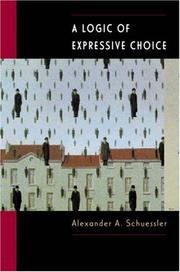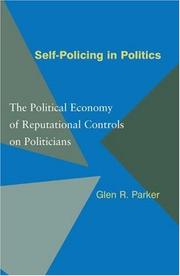| Listing 1 - 4 of 4 |
Sort by
|
Book
ISBN: 0691213208 Year: 1994 Publisher: Princeton, N.J. : Baltimore, Md. : Princeton University Press, Project MUSE,
Abstract | Keywords | Export | Availability | Bookmark
 Loading...
Loading...Choose an application
- Reference Manager
- EndNote
- RefWorks (Direct export to RefWorks)
Game theory is the mathematical analysis of strategic interaction. In the fifty years since the appearance of von Neumann and Morgenstern's classic Theory of Games and Economic Behavior (Princeton, 1944), game theory has been widely applied to problems in economics. Until recently, however, its usefulness in political science has been underappreciated, in part because of the technical difficulty of the methods developed by economists. James Morrow's book is the first to provide a standard text adapting contemporary game theory to political analysis. It uses a minimum of mathematics to teach the essentials of game theory and contains problems and their solutions suitable for advanced undergraduate and graduate students in all branches of political science. Morrow begins with classical utility and game theory and ends with current research on repeated games and games of incomplete information. The book focuses on noncooperative game theory and its application to international relations, political economy, and American and comparative politics. Special attention is given to models of four topics: bargaining, legislative voting rules, voting in mass elections, and deterrence. An appendix reviews relevant mathematical techniques. Brief bibliographic essays at the end of each chapter suggest further readings, graded according to difficulty. This rigorous but accessible introduction to game theory will be of use not only to political scientists but also to psychologists, sociologists, and others in the social sciences.
Axelrod, Robert. --- Banks, Jeffrey. --- Baron, David. --- Binmore, Ken. --- Calvert, Randall. --- Coke machine example. --- Cuban Missile Crisis. --- Downs, Anthony. --- Eatwell, John. --- Enelow, James. --- Ferejohn, John. --- Harsanyi, John. --- Jackman, Robert. --- Kreps, David. --- Ledyard, John. --- Luce, R. Duncan. --- Morrow, James. --- Nalebuff, Barry. --- Ordeshook, Peter. --- Palfrey, Thomas. --- Raiffa, Howard. --- babbling equilibrium. --- feasible payoffs. --- information set. --- international crises. --- node.
Book
ISBN: 0691221413 Year: 1989 Publisher: Princeton, New Jersey : Princeton University Press,
Abstract | Keywords | Export | Availability | Bookmark
 Loading...
Loading...Choose an application
- Reference Manager
- EndNote
- RefWorks (Direct export to RefWorks)
The description for this book, Political Equality: An Essay in Democratic Theory, will be forthcoming.
Equality. --- Adamany, David W. --- Aristotle. --- Bagehot, Walter. --- Barry, Brian. --- Democratic National Committee. --- Dunleavy, Patrick. --- Eldersveld, Samuel J. --- Ferejohn, John. --- Fleishman, Joel. --- Frendreis, John P. --- Gilpin, Thomas. --- Hampton, Jean. --- Hobbes, Thomas. --- Jenness v. Fortson. --- Jillson, Calvin C. --- Kant, Immanuel. --- Keeter, Scott. --- Lakeman, Enid. --- Lukes, Steven. --- Miller, David. --- Nagel, Thomas. --- Nelson, William N. --- Ostrogorski, M. --- Pateman, Carole. --- Pericles. --- Sterne, Simon. --- Taylor, Michael. --- Thomas, Keith. --- Thucydides. --- White v. Regester. --- Zukin, Cliff. --- anonymity. --- best result theories. --- blind apportionment criteria. --- citizenship roles. --- communitarianism. --- corruption. --- equilibrium, in voting. --- gerrymandering. --- independent expenditures. --- liberal stability. --- majority tyranny. --- personal representation. --- popular sovereignty. --- popular will,. --- programmatic competition. --- public goods. --- racial restrictions on voting. --- reapportionment. --- special majorities. --- vote dilution. --- white primary.

ISBN: 069100661X 0691006628 9780691006628 9780691006611 Year: 2000 Publisher: London : Princeton University Press,
Abstract | Keywords | Export | Availability | Bookmark
 Loading...
Loading...Choose an application
- Reference Manager
- EndNote
- RefWorks (Direct export to RefWorks)
Alexander Schuessler has done what many deemed impossible: he has wedded rational choice theory and the concerns of social theory and anthropology to explain why people vote. The "paradox of participation"--why individuals cast ballots when they have virtually no effect on electoral outcomes--has long puzzled social scientists. And it has particularly troubled rational choice theorists, who like to describe political activity in terms of incentives. Schuessler's ingenious solution is a "logic of expressive choice." He argues in incentive-based (or "economic") terms that individuals vote not because of how they believe their vote matters in the final tally but rather to express their preferences, allegiances, and thus themselves. Through a comparative history of marketing and campaigning, Schuessler generates a "jukebox model" of participation and shows that expressive choice has become a target for those eliciting mass participation and public support. Political advisers, for example, have learned to target voters' desire to express--to themselves and to others--who they are. Candidates, using tactics such as claiming popularity, invoking lifestyle, using ambiguous campaign themes, and shielding supporters from one another can get out their vote even when it is clear that an election is already lost or won. This important work, the first of its kind, will appeal to anyone seeking to decipher voter choice and turnout, social movements, political identification, collective action, and consumer behavior, including scholars, graduate students, and upper-level undergraduates in political science, economics, sociology, anthropology, and marketing. It will contribute greatly to our understanding and prediction of democratic participation patterns and their consequences.
Rational choice theory --- Voting --- Political participation --- Rational choice theory. --- Social choice --- Ansolabehere, Stephen. --- Appadurai, Arjun. --- Bartels, Larry. --- Bonaccorso, John. --- Brennan, Geoffrey. --- Carter, Jimmy. --- Clinton, Bill. --- Diamond, Edwin. --- Durkheim, Emile. --- Edelman, Murray. --- Eisenhower, Dwight D. --- Ferejohn, John. --- Giddens, Anthony. --- Goodman, Robert. --- Haug, Wolfgang. --- Herbst, Susan. --- Hotelling, Harold. --- Iyengar, Shanto. --- Jamieson, Kathleen Hall. --- Johnson, Lyndon. --- King, Gary. --- Lennon, John. --- Lennons Problem. --- Lifestyle. --- Mickelson, Sig. --- Nagler, Jonathan. --- Nixon, Richard. --- Olson, Mancur. --- Page, Benjamin. --- Riker, William. --- Scib. --- Tedlow, Richard. --- Verba, Sidney. --- Walker, Mary. --- Wright, Gerald. --- abstention. --- bandwagons (momentum). --- biographical narratives. --- chaos theorem. --- commodification. --- composition of utility. --- electoral campaigns. --- expressive tipping model. --- free-riding. --- identity (attachment). --- marketing. --- opinion polls. --- paradox of participation. --- participation costs. --- public goods. --- rational ignorance. --- selective incentives. --- snob-good. --- turnout. --- Voting. --- Political participation. --- Balloting --- Polls --- Elections --- Politics, Practical --- Suffrage --- Citizen participation --- Community action --- Community involvement --- Community participation --- Involvement, Community --- Mass political behavior --- Participation, Citizen --- Participation, Community --- Participation, Political --- Political activity --- Political behavior --- Political rights --- Social participation --- Political activists

ISBN: 069111739X Year: 2004 Publisher: Princeton, NJ : Princeton Univ. Press,
Abstract | Keywords | Export | Availability | Bookmark
 Loading...
Loading...Choose an application
- Reference Manager
- EndNote
- RefWorks (Direct export to RefWorks)
Contrary to what news reports might suggest, the majority of politicians behave ethically and are never subject to investigations. Is this because of the elaborate system of rules Congress has constructed to regulate the conduct of its members as well as the fear of electoral reprisal? Drawing on economic literature on the behavior of firms, Glenn Parker answers no. He argues that members of Congress behave ethnically not because of the fear of punishment but because of their concern for their reputations. He draws parallels between politicians and businesses, since both stand to suffer significantly when accused of wrongdoing. Just as business' poor behavior can cause brand names to be tarnished, prices to plummet, and future business to disappear, dishonest politicians stand to sacrifice the human capital invested in their careers, and premiums for honesty, such as electoral security and prestigious post-elective employment. Parker explores public attitudes toward the behavior of members of Congress and shows how those attitudes shape the way members conduct their professional lives. Written from the perspective of public choice, this book offers a novel approach to the question of how to keep politicians honest.
Self-control --- Political ethics --- Political corruption --- Legislators --- Economic aspects. --- United States. --- Agrawal, Anup. --- Akerlof, George H. --- Beard, Edmund. --- Bianco, William T. --- Cain, Bruce. --- Coase, Ronald H. --- Davis, Michael. --- Downs, Anthony. --- Ferejohn, John. --- Fiorina, Morris. --- Goff, Brian. --- Horn, Stephen. --- Ippolito, Pauline M. --- Klein, Benjamin. --- Krehbiel, Keith. --- Maloney, Michael. --- Ornstein, Norman J. --- Peltzman, Sam. --- Saloma, John S. --- Teeters, Holly. --- Van Houweling, Robert. --- Vanbeek, James R. --- Ward, Daniel S. --- Welch, Susan. --- Yiannakis, Diana Evans. --- adverse selection. --- assumptions: extended dealings. --- congressional casework. --- congressional foreign travel. --- corruption. --- elections: control of politicians. --- extended dealings. --- faithful-agent reputation: coding. --- home style. --- honoraria. --- hypotheses. --- incomplete contracts. --- last-period problems: in Congress. --- legislator-constituent contact. --- moral hazards. --- opportunism: check kiting. --- post-elective employment: categories of. --- price premium. --- principal-agent relationship. --- quasi-experimental research. --- quasi-rents. --- rational ignorance. --- reputation: accessibility. --- reputational control: evidence of. --- residual claimant. --- shirking: in Congress. --- vertical integration.
| Listing 1 - 4 of 4 |
Sort by
|

 Search
Search Feedback
Feedback About
About Help
Help News
News